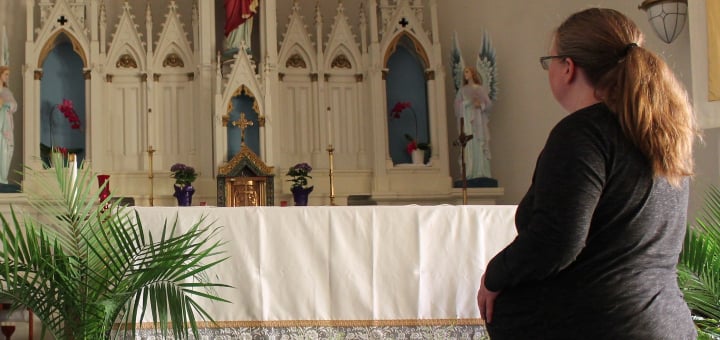
 Copyright 2018 Amanda Villagomez. All rights reserved.[/caption]
We are all called to holiness, and within the vocation of marriage, we know that we are called to lay down our lives for our families. We discern, on an ongoing basis, how we are called to love and serve and what we should be prioritizing. We consider choices based on our desires and dreams alongside the needs of our family and our own limitations. Mixed in with the joy, there can be layers of sorrow or disappointment along the way. It can be because of letting go of something we know we needed to but didn't want to or not having a door open that we thought God was positioning our lives toward.
It is beneficial to see the value in the challenging moments. Pondering the following inter-related ideas through prayer has helped me do so:
Copyright 2018 Amanda Villagomez. All rights reserved.[/caption]
We are all called to holiness, and within the vocation of marriage, we know that we are called to lay down our lives for our families. We discern, on an ongoing basis, how we are called to love and serve and what we should be prioritizing. We consider choices based on our desires and dreams alongside the needs of our family and our own limitations. Mixed in with the joy, there can be layers of sorrow or disappointment along the way. It can be because of letting go of something we know we needed to but didn't want to or not having a door open that we thought God was positioning our lives toward.
It is beneficial to see the value in the challenging moments. Pondering the following inter-related ideas through prayer has helped me do so:
- Trust: Often it is about reminding ourselves of the basics. Only God knows the big picture of our lives and how everything fits in his plans for us -- both for how he desires to use us as instruments if we use our free will to cooperate and his overall plan for how he will lead us step by step towards holiness.
- Assurance of Love: We know that God is working all things for our good (Romans 8:28). He will lead, guide, and carry us, knowing exactly what we need, when we need it and how we need it. When I feel sadness because I don't understand why something is working out the way it is, I think about Jesus' words, "I have much more to tell you, but you cannot bear it now" (John 16:12). Once I am able to recognize I am confused but then also acknowledge that I do not need to know the full picture, I feel more at peace.
- Thy Will Be Done: Jesus modeled for us many times the quality of embracing the Father's will. It is a lot easier to say thy will be done when it is something we wanted or were hoping for than when it is something that prompts a sense of loss. Yet, it is in those more challenging moments that we have the chance to see whether or not we actually mean thy will be done. The greater the disappointment, the greater the opportunity to grow in faith and demonstrate our love for God's will, trusting in his providence. Scripture points toward countless examples of why we have all the reason to have faith and hope, including the ultimate example of the crucifixion not being the ending.
- Gratitude: When things do not work out the way we expected or how we hoped they would, it is critical to focus on gratitude. Yet, recently I recognized that a sense of good, better, best that can be so helpful with discerning resulted in areas of gratitude with caveats about the present. I noticed a pattern of I am grateful for ____, but ____ would have been better or I am grateful for ____, but I really wanted _____. A priest reminded me that gratitude is about being thankful for what is, rather than what could be or should be.
- No/Yes: Whenever we say no to something, it is in order to say yes to something else. What we are saying yes to can reveal a sense of purpose that brings consolation in the face of loss. It is easier when we were the ones making the choice. Yet, we can still apply the same logic for each no in our lives that was not our choice - for those doors that were closed or never opened to begin with. Through the lens of a trust in God's providence, we can start to ponder, if this is a no, then what are the yeses in my life right now? Each yes can be viewed as a gift and often helps put each no in proper perspective.
- Ponder the Possibilities: When we ponder the lives of others - in Scripture, the lives of Saints, those seeking to live a holy life -- we can see abundant examples of God's interactions with people over time centered on love and all the possibilities for the purpose behind different scenarios. By zooming out from current situations, we can reflect on the way God beautifully weaves together our lives and how each small moment has a bigger purpose leading us toward him, all that really matters.
- Growth: Having something not go our way provides an opportunity to recognize our emotions, but then remember we can decide how to respond to the contexts. We can recognize that we want to cling to a position or possession but then let go, that we are leaning towards doubt but then consciously shift back to trust, that we feel a sense of rejection but then choose to view it as an opportunity to grow in humility...
Copyright 2018 Amanda Villagómez
About the Author

Amanda Villagómez
Amanda Villagómez is a wife, mom of 6, and teacher educator. On her personal site, she focuses on the beauty of becoming who God created us to be by celebrating the process of change and growth.


.png?width=1806&height=731&name=CatholicMom_hcfm_logo1_pos_871c_2728c%20(002).png)
Comments